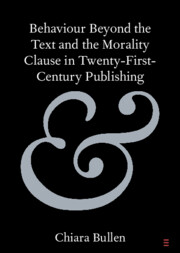Element contents
Behaviour Beyond the Text and the Morality Clause in Twenty-First-Century Publishing
Published online by Cambridge University Press: 05 December 2024
Summary
Keywords
- Type
- Element
- Information
- Online ISBN: 9781009573184Publisher: Cambridge University PressPrint publication: 05 December 2024

